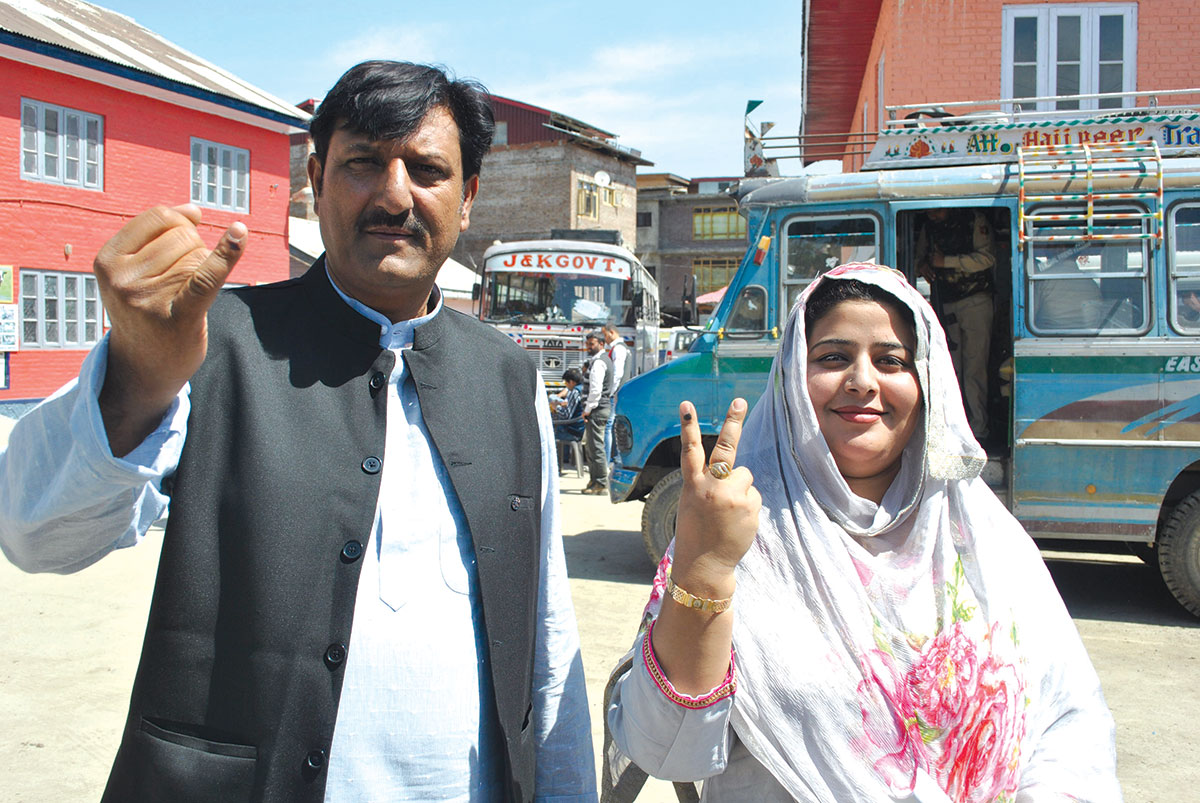by Sheikh Mushtaq

Last week, strife-weary residents emerged in nervous trickles to cast their votes at highly guarded polling booths in few parts of south Kashmir, to send their representative to Lok Sabha, India’s parliament. Many in Kashmir have no faith in Lok Sabha and so many see the six members from Jammu and Kashmir as an insignificant presence.
Polls are being held in three phases in the explosive Anantnag parliamentary constituency of south Kashmir which has witnessed mayhem and widespread bloodletting in recent past. Polls in the region followed elections in north and central Kashmir in the two earlier phases.
Thousands of troops, earlier deployed in central and north Kashmir, were redeployed in relatively peaceful areas of Bijbehara, Pahalgam, Shangus, Kokernag and Dooru to guard Tuesday’s vote, although the turnout was less than 14 per cent. The government had flown more than 350 companies of the paramilitary forces for elections. These are in addition to tens of thousands of troops already deployed in Kashmir for counterinsurgency operations, and what is officially said, maintaining law and order.
Bijbehara, the home town of Mehbooba Mufti, the leader of People’s Democratic Party (PDP), recorded the lowest turnout of 2.04%, against 37% in 2014. Mehbooba is in the fray along with 17 other candidates including National Conference’s (NC’s) Justice (retd) Hasnain Masoodi and state Congress chief, Ghulam Ahmad Mir.
The voting percentage may further dip in the next two phases in south Kashmir as poll enters into volatile territories where troops have intensified anti-militancy operations resulting in bloodshed and human rights violations.
Security forces have further stepped up crackdowns across the valley after a suicide car bombing killed 40 security personnel on February 14 in Pulwama. More than 200 separatists have been detained since.
The area is on the edge because hundreds have died and thousands maimed in south Kashmir since the killing of militant leader Burhan Wani in 2016. Wani’s death sparked a new phase of deadly protests that have pushed a growing number of youths in south Kashmir towards the rebellion.
The war-torn Anantnag parliamentary constituency is the first in history to have polls in three phases. District Anantnag went to polls on April 23, Kulgam will go to polls on April 29, and Shopian and Pulwama on May 6.
“There is a huge disillusionment among the people because of violence and bloodshed … people of J&K have suffered because of the betrayal and misleading politics on the part of PDP, BJP and others,” J&K Pradesh Congress Committee (JKPCC) President and the party candidate GA Mir said in an election rally recently.
In Kashmir, sentiment against Delhi’s rule runs deep and India’s aggressive, muscular policy has further alienated the people and resulted in an escalation of violence. Last year witnessed the highest number of civilian casualties in a decade. Most of the dead belong to south Kashmir.
Violence involving security grid has further angered people in the blood splattered hamlets, villages and townships across south Kashmir.
Kashmir’s former chief minister and leader of National Conference, Omar Abdullah has appealed residents to participate in elections to give anger a voice.
“To the voters of Anantnag, please don’t reward the death, destruction & deceit of the last 4 years by staying home & boycotting the election. Come out & vote to give your anger a voice. Vote for the best candidate in the field, vote for @masoodi_hasnain,” Omar said in a tweet.
Some senior officials say that democracy had failed Jammu and Kashmir’s population of more than 10 million and Delhi needs to instil confidence in the system.
“The people have been let down by the democratic process. It has led to alienation from the (Indian) state, which has been one cause of the violence. Anyone must agree with that,” said a senior official.
Disappointment with Indian democracy has been one of the major causes of the bloody 30-year fight for secession that has so far left tens of thousands dead. Thousands have gone missing after their arrest.
Kashmir, not people of Kashmir, is a key issue in India’s election, distracting from concerns about how the Bharatiya Janata Party (BJP) led government has managed the poverty, unemployment and economy of the country.
Making an election promise, the BJP has vowed to scrap article 370 of Indian constitution and strip decades-old special rights from the people of Jammu and Kashmir.
Disappointments litter Kashmir’s history since India’s independence in 1947, which preceded the end of Independence in the Himalayan state.
Polls will end, voter turnout may be very low, Delhi will still claim victory in Kashmir and lawmakers from the disputed region will go to Indian parliament next month, but the tensions and unanswered grievances remain.














